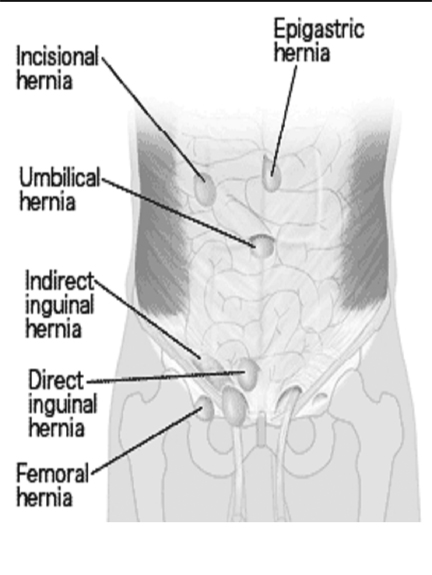By Dr Anirban Banerjee, MS, MRCS (Consultant Surgeon)
What is hernia?
 Hernia is a bulge or protrusion of the soft tissue that forces its way through or between muscles. Normally, body muscles are taut and firm. They press on various tissues and organs, helping to restrain them and keep them in the correct position within the body.
Hernia is a bulge or protrusion of the soft tissue that forces its way through or between muscles. Normally, body muscles are taut and firm. They press on various tissues and organs, helping to restrain them and keep them in the correct position within the body.
Almost all hernias are the same thing, namely a ‘window of weakness’ that has opened up in the wall tissue. The name, more than anything else, relates to the location of the hernia.
Who can get a hernia?
Anybody, of either sex and of any age can get hernia.

How do hernias happen?
The wall of the abdomen, comprising muscle and tendon, performs several functions, one of which is to provide strong support to the internal organs which are exerting significant outward pressure. The opening of a gap in the tissue can occur of its own accord at a point of natural weakness, or by over-stretching a part of the tissue.
Almost every movement we make puts additional pressure on the internal tissues which in turn, push out through the opening a little more each time. This also enlarges the opening itself. If unchecked, this process can continue even to the extent of allowing much of the intestine to hang down through the hernia.
What are the symptoms?
The main symptom of a hernia is the appearance of a lump in your abdomen, or groin area. The lump may be painless and only be discovered during a check-up.
In some cases, you may be able to push the lump back into your abdomen. This is known as a reducible hernia. A hernia that cannot be pushed back into place is known as an irreducible hernia. People with an irreducible hernia are more likely to experience a bowel obstruction (when a section of intestine becomes trapped in the weak spot to a block the passage of stool) or an interruption of the blood supply to the intestine, which is known as a strangulated hernia.
When should medical advice be sought?
Even if the hernia is not causing you pain, you need to be seen by a surgeon. Surgery may be required to prevent a bowel obstruction, or a strangulated hernia. Both a bowel obstruction and a strangulated hernia can be life-threatening and require emergency surgery. A significant number of hernia surgeries are carried out on an emergency basis.
Will a hernia go away?
An untreated hernia will not get better on its own or with any other measures. It may not get worse for months or even years, but still you should seek the opinion of a surgeon.
How is hernia diagnosed?
Almost all hernias can be successfully diagnosed through a physical examination. Only rarely does a doctor advise a test to diagnose hernia.
What is the treatment?
Surgery is usually required to repair a hernia. During surgery, the surgeon will place the protruding intestine, or tissue, back into the abdominal wall. The muscles of the abdominal wall will then be strengthened by fixing a synthetic mesh to the muscles.
There are now two ways that a hernia repair can be carried out:
Open surgery – where the surgeon will make a large incision in your abdomen, and
Laparoscopic, or keyhole surgery – where the surgeon will only make a very small incision in your abdomen, before using a specially designed camera, and instruments, to perform the surgery.
Advantages and disadvantages of surgical techniques
Open surgery usually has a longer recovery time than laparoscopic surgery, and more post-operative pain but, unlike laparoscopic surgery, it can be carried out using a local anaesthetic. This can be an important advantage for elderly people or those in bad health because they may be too weak, or frail, to safely receive a general anaesthetic.
Laparoscopic surgery tends to have a quicker recovery time, and cause less post-operative pain compared with open surgery.
Specific benefits of laparoscopic surgery
It is tension-free, with mesh placed on the inside of abdominal wall. It is similar to patching up a tire, minimally invasive, with 3 tiny incisions, There is faster recovery, a quicker return to normal activities and to work, less pain, fewer complications related to the wound, cord or scrotum, such as infection or bleeding.
Aftercare
Patients should eat a clear liquid diet until the gastrointestinal tract begins functioning again. Normally this is a short period of time. After that, they are free to eat a healthy, well-balanced diet of their choice. They may bathe normally, using a gentle, unscented soap.
Patients should begin easy activities, such as walking, as soon as they are comfortable, but should avoid strenuous exercise for four to six weeks, and especially avoid heavy lifting. Learning and practising proper lifting techniques is an important part after the operation.
The outcome of surgery depends on the age and health of the patient and on the type of hernia. Although most hernias can be repaired without complications, hernias recur in 2-5% people who have had hernia surgery.
Is there any way to prevent hernia?
A persistent cough is a common risk factor for all types of hernias. Most persistent coughs are caused by conditions that affect the lungs and the respiratory system, such as chronic obstructive pulmonary disorder (COPD). These lung and respiratory conditions are often the result of damage or irritation, caused by smoking.
If you are a smoker, giving up is the best thing that you can do to prevent a hernia, as well as preventing other potentially fatal health conditions, such as lung cancer, stroke and heart disease.
